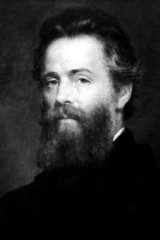Moby-Dick Page #16
Moby-Dick; or, The Whale is an 1851 novel by American writer Herman Melville. The book is sailor Ishmael's narrative of the obsessive quest of Ahab, captain of the whaling ship Pequod, for revenge on Moby Dick, the white whale that on the ship's previous voyage bit off Ahab's leg at the knee.
We then turned over the book together, and I endeavored to explain to him the purpose of the printing, and the meaning of the few pictures that were in it. Thus I soon engaged his interest; and from that we went to jabbering the best we could about the various outer sights to be seen in this famous town. Soon I proposed a social smoke; and, producing his pouch and tomahawk, he quietly offered me a puff. And then we sat exchanging puffs from that wild pipe of his, and keeping it regularly passing between us. If there yet lurked any ice of indifference towards me in the Pagan's breast, this pleasant, genial smoke we had, soon thawed it out, and left us cronies. He seemed to take to me quite as naturally and unbiddenly as I to him; and when our smoke was over, he pressed his forehead against mine, clasped me round the waist, and said that henceforth we were married; meaning, in his country's phrase, that we were bosom friends; he would gladly die for me, if need should be. In a countryman, this sudden flame of friendship would have seemed far too premature, a thing to be much distrusted; but in this simple savage those old rules would not apply. After supper, and another social chat and smoke, we went to our room together. He made me a present of his embalmed head; took out his enormous tobacco wallet, and groping under the tobacco, drew out some thirty dollars in silver; then spreading them on the table, and mechanically dividing them into two equal portions, pushed one of them towards me, and said it was mine. I was going to remonstrate; but he silenced me by pouring them into my trowsers' pockets. I let them stay. He then went about his evening prayers, took out his idol, and removed the paper fireboard. By certain signs and symptoms, I thought he seemed anxious for me to join him; but well knowing what was to follow, I deliberated a moment whether, in case he invited me, I would comply or otherwise. I was a good Christian; born and bred in the bosom of the infallible Presbyterian Church. How then could I unite with this wild idolator in worshipping his piece of wood? But what is worship? thought I. Do you suppose now, Ishmael, that the magnanimous God of heaven and earth—pagans and all included—can possibly be jealous of an insignificant bit of black wood? Impossible! But what is worship?—to do the will of God—that is worship. And what is the will of God?—to do to my fellow man what I would have my fellow man to do to me—that is the will of God. Now, Queequeg is my fellow man. And what do I wish that this Queequeg would do to me? Why, unite with me in my particular Presbyterian form of worship. Consequently, I must then unite with him in his; ergo, I must turn idolator. So I kindled the shavings; helped prop up the innocent little idol; offered him burnt biscuit with Queequeg; salamed before him twice or thrice; kissed his nose; and that done, we undressed and went to bed, at peace with our own consciences and all the world. But we did not go to sleep without some little chat. How it is I know not; but there is no place like a bed for confidential disclosures between friends. Man and wife, they say, there open the very bottom of their souls to each other; and some old couples often lie and chat over old times till nearly morning. Thus, then, in our hearts' honeymoon, lay I and Queequeg—a cosy, loving pair. CHAPTER 11. Nightgown. We had lain thus in bed, chatting and napping at short intervals, and Queequeg now and then affectionately throwing his brown tattooed legs over mine, and then drawing them back; so entirely sociable and free and easy were we; when, at last, by reason of our confabulations, what little nappishness remained in us altogether departed, and we felt like getting up again, though day-break was yet some way down the future. Yes, we became very wakeful; so much so that our recumbent position began to grow wearisome, and by little and little we found ourselves sitting up; the clothes well tucked around us, leaning against the head-board with our four knees drawn up close together, and our two noses bending over them, as if our kneepans were warming-pans. We felt very nice and snug, the more so since it was so chilly out of doors; indeed out of bed-clothes too, seeing that there was no fire in the room. The more so, I say, because truly to enjoy bodily warmth, some small part of you must be cold, for there is no quality in this world that is not what it is merely by contrast. Nothing exists in itself. If you flatter yourself that you are all over comfortable, and have been so a long time, then you cannot be said to be comfortable any more. But if, like Queequeg and me in the bed, the tip of your nose or the crown of your head be slightly chilled, why then, indeed, in the general consciousness you feel most delightfully and unmistakably warm. For this reason a sleeping apartment should never be furnished with a fire, which is one of the luxurious discomforts of the rich. For the height of this sort of deliciousness is to have nothing but the blanket between you and your snugness and the cold of the outer air. Then there you lie like the one warm spark in the heart of an arctic crystal. We had been sitting in this crouching manner for some time, when all at once I thought I would open my eyes; for when between sheets, whether by day or by night, and whether asleep or awake, I have a way of always keeping my eyes shut, in order the more to concentrate the snugness of being in bed. Because no man can ever feel his own identity aright except his eyes be closed; as if darkness were indeed the proper element of our essences, though light be more congenial to our clayey part. Upon opening my eyes then, and coming out of my own pleasant and self-created darkness into the imposed and coarse outer gloom of the unilluminated twelve-o'clock-at-night, I experienced a disagreeable revulsion. Nor did I at all object to the hint from Queequeg that perhaps it were best to strike a light, seeing that we were so wide awake; and besides he felt a strong desire to have a few quiet puffs from his Tomahawk. Be it said, that though I had felt such a strong repugnance to his smoking in the bed the night before, yet see how elastic our stiff prejudices grow when love once comes to bend them. For now I liked nothing better than to have Queequeg smoking by me, even in bed, because he seemed to be full of such serene household joy then. I no more felt unduly concerned for the landlord's policy of insurance. I was only alive to the condensed confidential comfortableness of sharing a pipe and a blanket with a real friend. With our shaggy jackets drawn about our shoulders, we now passed the Tomahawk from one to the other, till slowly there grew over us a blue hanging tester of smoke, illuminated by the flame of the new-lit lamp.
Translation
Translate and read this book in other languages:
Select another language:
- - Select -
- 简体中文 (Chinese - Simplified)
- 繁體中文 (Chinese - Traditional)
- Español (Spanish)
- Esperanto (Esperanto)
- 日本語 (Japanese)
- Português (Portuguese)
- Deutsch (German)
- العربية (Arabic)
- Français (French)
- Русский (Russian)
- ಕನ್ನಡ (Kannada)
- 한국어 (Korean)
- עברית (Hebrew)
- Gaeilge (Irish)
- Українська (Ukrainian)
- اردو (Urdu)
- Magyar (Hungarian)
- मानक हिन्दी (Hindi)
- Indonesia (Indonesian)
- Italiano (Italian)
- தமிழ் (Tamil)
- Türkçe (Turkish)
- తెలుగు (Telugu)
- ภาษาไทย (Thai)
- Tiếng Việt (Vietnamese)
- Čeština (Czech)
- Polski (Polish)
- Bahasa Indonesia (Indonesian)
- Românește (Romanian)
- Nederlands (Dutch)
- Ελληνικά (Greek)
- Latinum (Latin)
- Svenska (Swedish)
- Dansk (Danish)
- Suomi (Finnish)
- فارسی (Persian)
- ייִדיש (Yiddish)
- հայերեն (Armenian)
- Norsk (Norwegian)
- English (English)
Citation
Use the citation below to add this book to your bibliography:
Style:MLAChicagoAPA
"Moby-Dick Books." Literature.com. STANDS4 LLC, 2024. Web. 25 Dec. 2024. <https://www.literature.com/book/moby-dick_18>.




Discuss this Moby-Dick book with the community:
Report Comment
We're doing our best to make sure our content is useful, accurate and safe.
If by any chance you spot an inappropriate comment while navigating through our website please use this form to let us know, and we'll take care of it shortly.
Attachment
You need to be logged in to favorite.
Log In